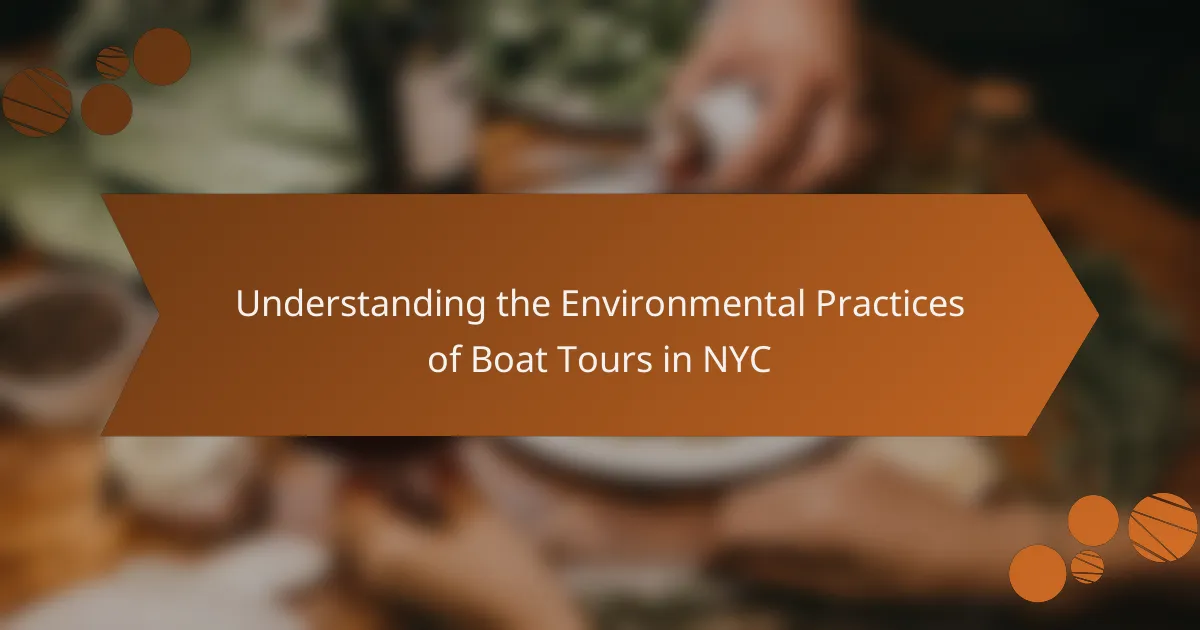Boat tours in NYC are increasingly adopting sustainable practices to reduce their environmental footprint. By utilizing eco-friendly vessels and implementing effective waste management systems, these tours not only enhance the visitor experience but also contribute to the preservation of local ecosystems. Engaging in conservation efforts, they invite customers to participate in protecting the city’s waterways and marine life.
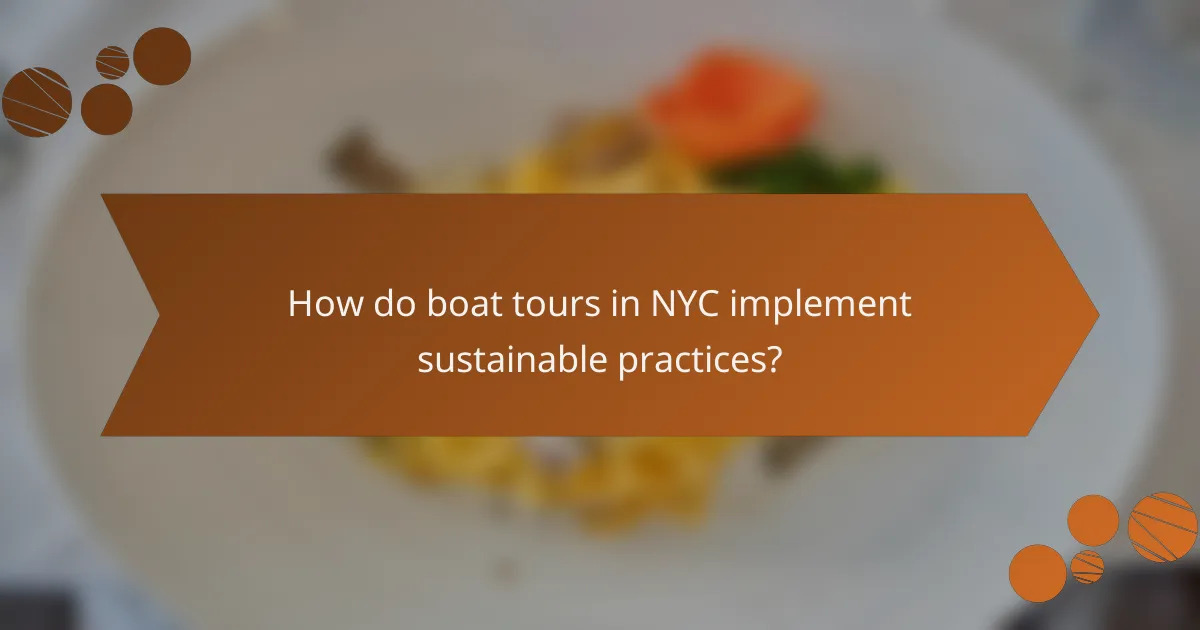
How do boat tours in NYC implement sustainable practices?
Boat tours in NYC adopt various sustainable practices to minimize their environmental impact. These include using eco-friendly vessels, implementing waste management systems, and forming partnerships with environmental organizations.
Use of eco-friendly vessels
Many boat tour operators in NYC are transitioning to eco-friendly vessels that utilize cleaner energy sources. These boats often run on electric or hybrid engines, reducing emissions and noise pollution in the waterways.
Additionally, some companies are exploring the use of sustainable materials in their vessel construction, which helps to lower their overall environmental footprint. Passengers can look for operators that highlight their commitment to sustainability in their marketing materials.
Waste management systems
Effective waste management is crucial for maintaining the cleanliness of NYC’s waterways. Boat tours typically implement systems for sorting and disposing of waste, including recycling and composting programs.
Operators often provide clear instructions to passengers on how to dispose of waste properly during the tour. This not only helps keep the environment clean but also raises awareness among tourists about the importance of responsible waste disposal.
Partnerships with environmental organizations
Many boat tour companies collaborate with environmental organizations to promote conservation efforts and educate the public. These partnerships can involve beach clean-up events, educational programs, and fundraising for local environmental initiatives.
By aligning with these organizations, boat tours can enhance their sustainability practices and contribute positively to the local ecosystem. Tourists can inquire about these partnerships to learn more about the environmental impact of their chosen tour operator.
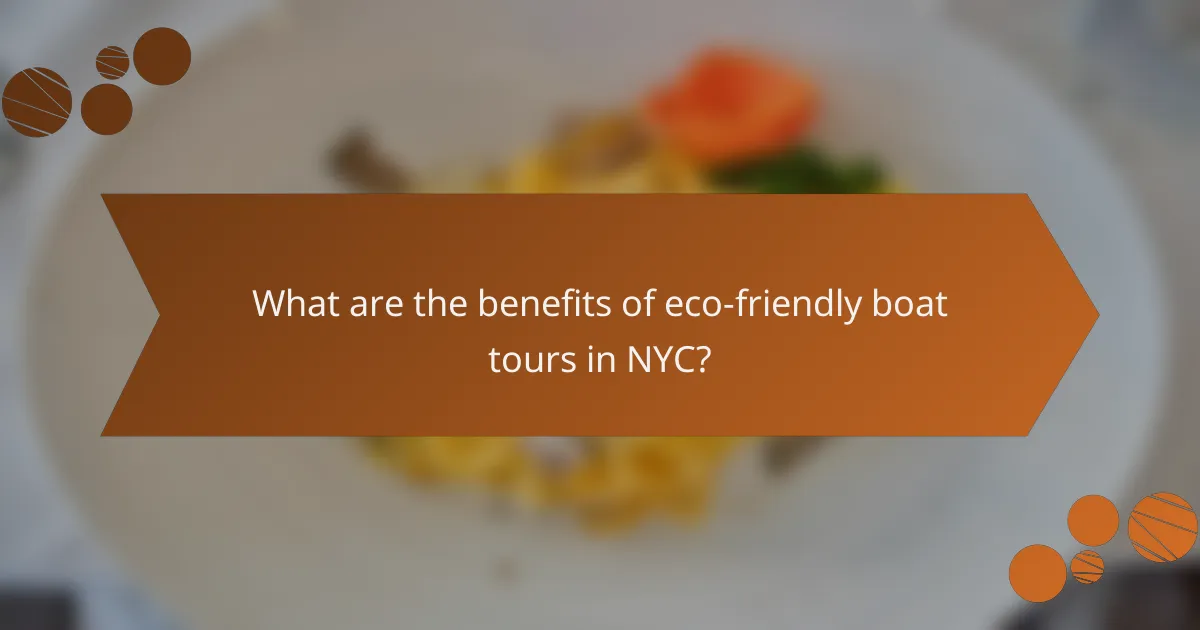
What are the benefits of eco-friendly boat tours in NYC?
Eco-friendly boat tours in NYC offer numerous advantages, including reduced environmental impact and support for local ecosystems. These tours prioritize sustainability, contributing to cleaner waterways and healthier marine life while engaging the community in conservation efforts.
Reduced carbon emissions
Eco-friendly boat tours typically utilize electric or hybrid engines, significantly lowering carbon emissions compared to traditional diesel-powered vessels. This shift helps improve air quality in New York City, which is crucial for both residents and visitors.
By minimizing greenhouse gas emissions, these tours contribute to the city’s overall climate goals. Tour operators often adhere to strict environmental regulations, ensuring their practices align with local sustainability initiatives.
Enhanced marine biodiversity
Eco-friendly boat tours promote the health of marine ecosystems by reducing pollution and disturbance to wildlife. These tours often include educational components that raise awareness about local species and their habitats, fostering a deeper appreciation for marine biodiversity.
Operators may also participate in conservation efforts, such as clean-up initiatives or partnerships with local environmental organizations, directly benefiting the waters surrounding NYC.
Positive community impact
Eco-friendly boat tours can stimulate local economies by attracting environmentally conscious tourists. This influx can support small businesses and create jobs in the tourism and hospitality sectors, contributing to community development.
Additionally, these tours often engage local residents in conservation activities, building a sense of community and shared responsibility for protecting the environment. By participating in eco-friendly practices, boat tour operators can inspire others to adopt sustainable habits.
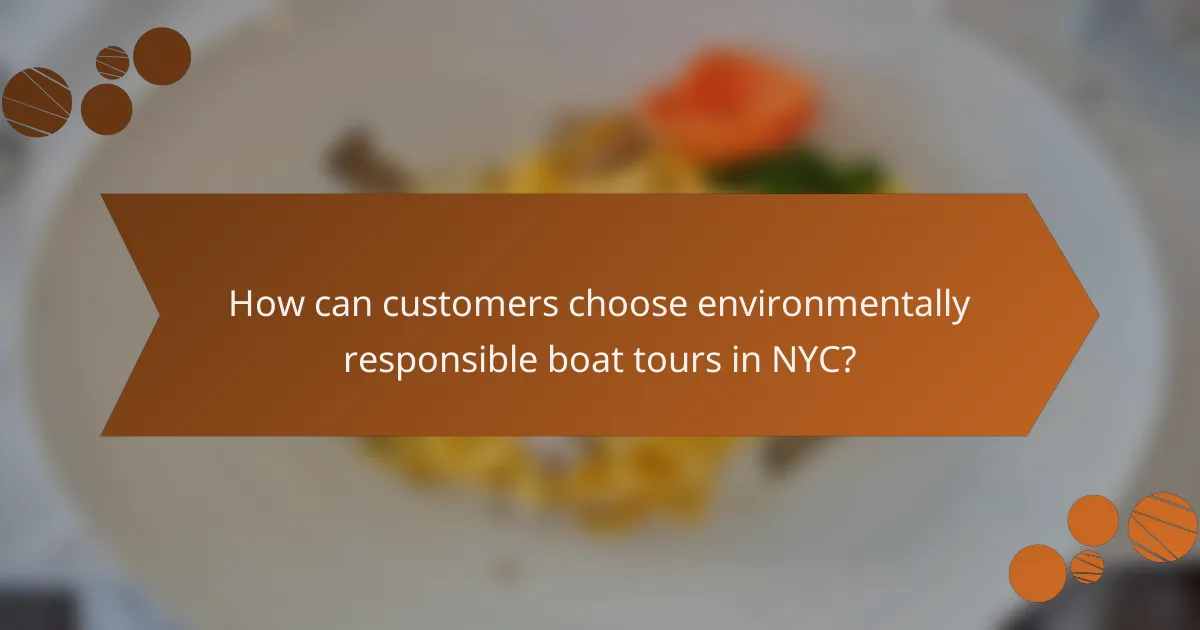
How can customers choose environmentally responsible boat tours in NYC?
Customers can choose environmentally responsible boat tours in NYC by researching companies’ sustainability practices, reviewing customer feedback, and evaluating the itineraries offered. These steps help ensure that the tours minimize environmental impact and promote eco-friendly practices.
Researching company certifications
Look for boat tour companies that hold recognized environmental certifications, such as the Green Business Certification or similar eco-labels. These certifications indicate a commitment to sustainable practices, including waste reduction and energy efficiency.
Additionally, check if the company participates in local environmental initiatives or partnerships with conservation organizations. This involvement can further demonstrate their dedication to protecting NYC’s waterways and ecosystems.
Reviewing customer feedback
Customer reviews can provide insights into a company’s environmental practices. Look for comments that specifically mention sustainability efforts, such as the use of clean energy sources or waste management systems.
Platforms like TripAdvisor or Yelp often feature reviews that highlight eco-friendly practices. Pay attention to recurring themes in feedback, as they can indicate the company’s reliability in maintaining environmentally responsible operations.
Evaluating tour itineraries
Examine the itineraries of potential boat tours to see how they interact with the environment. Tours that prioritize wildlife viewing or educational experiences about local ecosystems often reflect a commitment to sustainability.
Consider tours that limit their capacity to reduce overcrowding and minimize disturbances to marine life. Additionally, inquire about the types of vessels used; electric or hybrid boats are typically more environmentally friendly than traditional fuel-powered options.
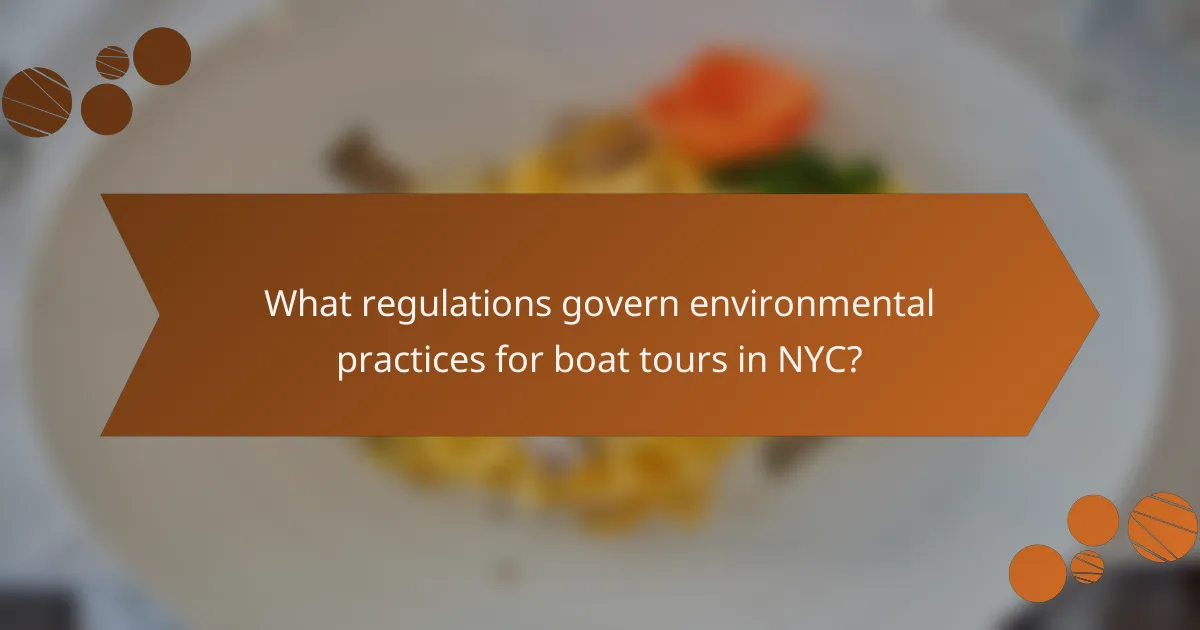
What regulations govern environmental practices for boat tours in NYC?
Boat tours in New York City are regulated by a combination of local environmental laws, federal maritime regulations, and compliance requirements set by the NYC Parks Department. These regulations aim to minimize the environmental impact of boating activities while ensuring safety and sustainability.
Local environmental laws
Local environmental laws in NYC focus on protecting water quality, wildlife, and natural habitats. The New York City Department of Environmental Protection (DEP) enforces regulations that limit pollution from boat operations, including restrictions on waste disposal and fuel use.
Boat tour operators must adhere to specific guidelines regarding emissions and noise levels, which are designed to mitigate their impact on the urban ecosystem. Compliance with these laws is crucial for maintaining permits and licenses to operate.
Federal maritime regulations
Federal maritime regulations, primarily enforced by the U.S. Coast Guard, set standards for safety and environmental protection on navigable waters. These regulations include requirements for vessel inspections, crew training, and emergency preparedness.
Additionally, the Clean Water Act mandates that boat operators implement practices to prevent oil spills and manage hazardous materials. Adhering to these federal standards is essential for ensuring the safety of passengers and the protection of marine environments.
Compliance with NYC Parks Department
The NYC Parks Department oversees the operation of boat tours in city parks and waterways, ensuring that operators comply with park regulations. This includes guidelines on noise restrictions, operating hours, and environmental stewardship practices.
Operators are encouraged to participate in educational programs about local ecosystems and to promote sustainable practices among their staff and customers. Regular inspections by the Parks Department help ensure compliance and protect the integrity of NYC’s natural resources.
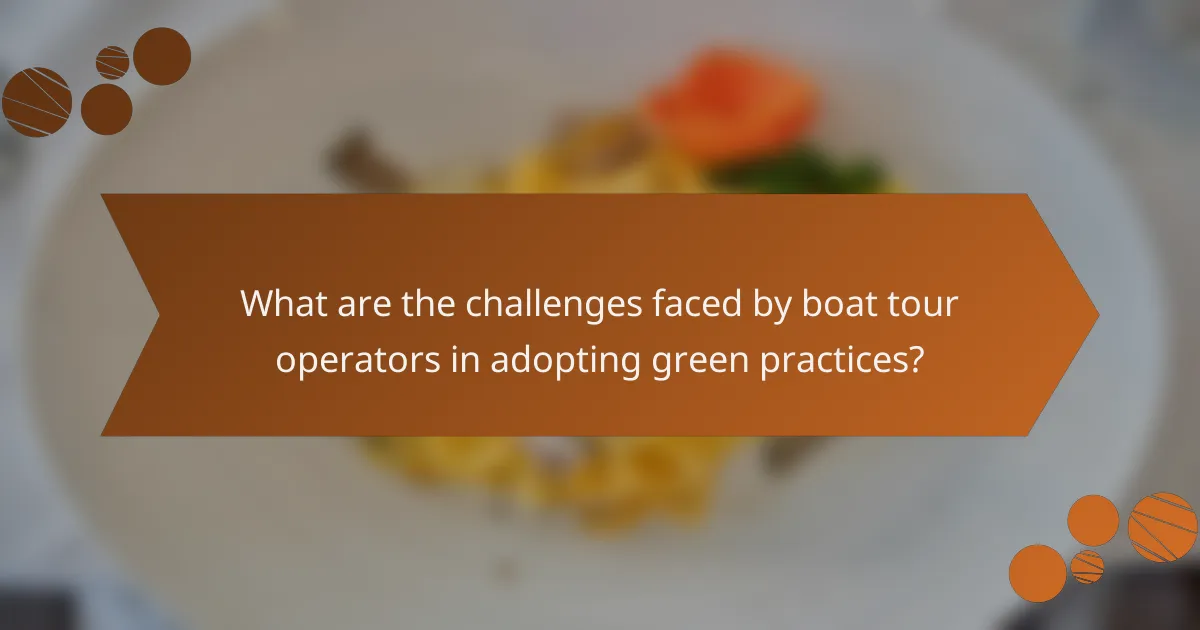
What are the challenges faced by boat tour operators in adopting green practices?
Boat tour operators in NYC encounter several challenges when trying to implement environmentally friendly practices. These obstacles include high operational costs, limited access to sustainable technology, and the need to balance tourism demand with environmental impact.
High operational costs
One of the primary challenges for boat tour operators is the high operational costs associated with adopting green practices. Transitioning to eco-friendly vessels or retrofitting existing boats often requires significant upfront investment, which can deter operators from making the switch.
Additionally, maintaining and operating green technologies, such as electric engines or advanced waste management systems, can lead to increased ongoing expenses. Operators must carefully evaluate the long-term benefits against these costs to determine feasibility.
Limited access to sustainable technology
Boat tour operators often face limited access to sustainable technology that meets their operational needs. While innovations in eco-friendly propulsion systems and materials are emerging, they may not be widely available or affordable for all operators.
Furthermore, the regulatory landscape can complicate the adoption of new technologies. Operators must navigate local regulations and standards, which can vary significantly, potentially hindering the implementation of greener solutions.
Balancing tourism demand with environmental impact
Another significant challenge is balancing the high demand for boat tours with the need to minimize environmental impact. As tourism in NYC continues to grow, operators must find ways to meet customer expectations while reducing their ecological footprint.
This often involves making difficult choices about capacity, frequency of tours, and the types of vessels used. Operators may consider strategies such as limiting the number of tours during peak times or investing in more efficient boats to help mitigate their environmental impact while still catering to tourists.
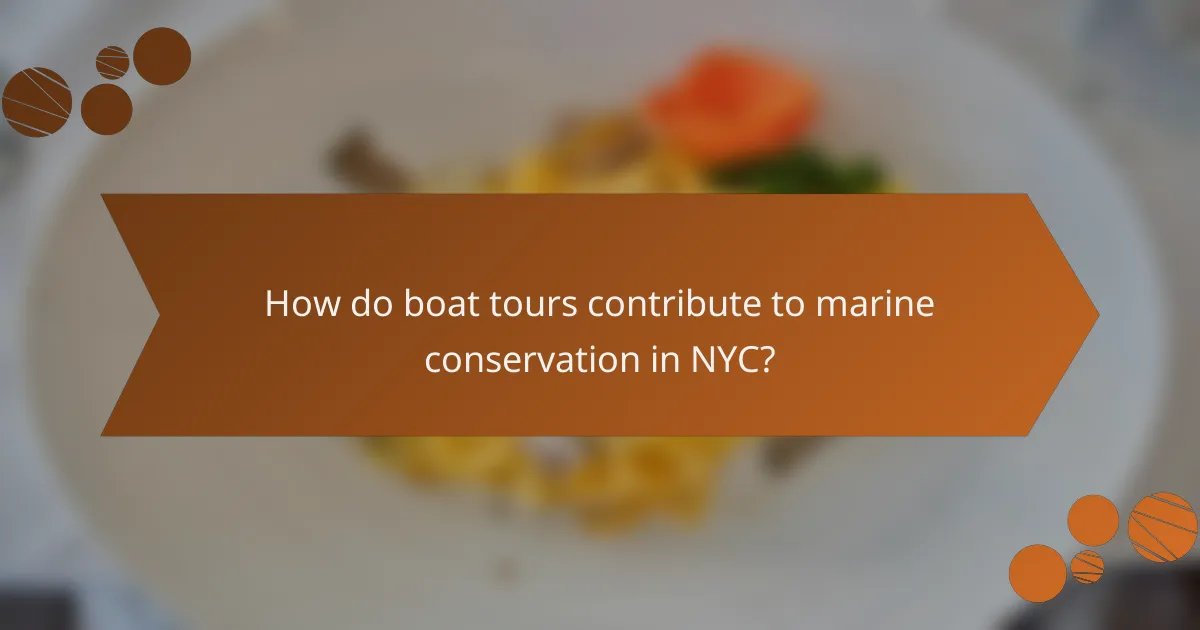
How do boat tours contribute to marine conservation in NYC?
Boat tours in NYC play a significant role in marine conservation by funding local projects and raising awareness among tourists. These tours often incorporate eco-friendly practices and educational elements that promote the health of the surrounding waterways.
Funding for local conservation projects
Many boat tour operators allocate a portion of their profits to support local marine conservation initiatives. This funding can be directed toward habitat restoration, pollution cleanup, and wildlife protection efforts in New York’s waterways.
For instance, some tours partner with non-profit organizations focused on preserving local ecosystems, allowing tourists to contribute to these causes simply by enjoying their experience on the water. This collaborative approach helps ensure that funds are used effectively to address pressing environmental issues.
Educational programs for tourists
Boat tours often include educational programs that inform tourists about the importance of marine conservation. These programs typically cover topics such as local wildlife, the impact of pollution, and the significance of preserving natural habitats.
Tour guides frequently share insights on how individuals can contribute to conservation efforts, encouraging responsible behavior both on and off the water. By engaging tourists in these discussions, boat tours foster a sense of stewardship for the marine environment among visitors to NYC.
